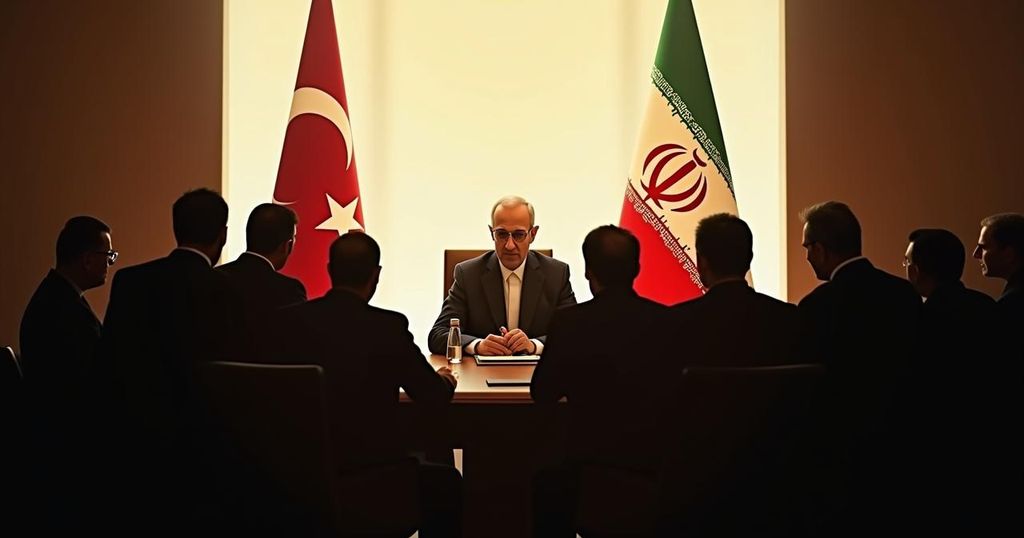Iran Foreign Minister’s Visit to Beirut Amid Regional Tensions and Diplomatic Shifting
Iran’s Foreign Minister Abbas Araghchi visited Beirut following significant missile strikes against Israel, coinciding with Israeli airstrikes in Lebanon. New diplomatic engagements in Doha signal potential rapprochement between Iran and Saudi Arabia, while Gulf states reaffirmed their neutrality amid escalating tensions. The humanitarian toll in Lebanon remains severe in light of ongoing conflict.
On Friday, Iranian Foreign Minister Abbas Araghchi arrived in Beirut, marking a significant diplomatic engagement from Iran amid ongoing regional tensions. This visit follows a series of Iranian missile strikes against Israel, reported by Iranian state media, and comes after Israeli airstrikes targeted areas near Beirut’s airport influential to the Lebanese militant group Hezbollah. Araghchi is scheduled to engage with key Lebanese officials, including Caretaker Prime Minister Najib Mikati and Speaker of Parliament Nabih Berri, both of whom are aligned with Hezbollah. On the diplomatic front, a high-profile summit in Doha has seen Iranian and Gulf leaders reconvene, signaling a potential thaw in relations between Iran and its regional rival, Saudi Arabia. During discussions, Iranian President Masoud Pezeshkian expressed a desire to enhance ties with Riyadh, emphasizing the importance of unity among Islamic nations. Saudi Foreign Minister Faisal bin Farhan responded affirmatively, stating Riyadh’s commitment to resolving bilateral differences. Concurrently, members of the Gulf Cooperation Council expressed their neutrality regarding the escalating Iran-Israel conflict, aiming to reassure Iran amidst rising tensions influenced by regional security concerns, particularly for oil-rich nations like Saudi Arabia. The backdrop to this diplomatic activity includes Iran’s recent response to the assassination of key figures associated with Hezbollah and Hamas, which it classified as a legitimate act of self-defense. Iranian Supreme Leader Ali Khamenei, addressing a large crowd in Tehran, asserted the right of nations to defend themselves against aggression, thereby underscoring Iran’s narrative of unity against common adversaries in the region. Amidst this turbulent atmosphere, the conflict has had dire humanitarian consequences, particularly in Lebanon, where heightened violence has resulted in substantial casualties and the displacement of civilians, pressing the UN refugee agency to raise concerns about shelter capacities for the affected population.
The recent visit of the Iranian Foreign Minister to Beirut occurs in a context of increased hostilities in the Middle East, particularly following Iran’s missile assault on Israel, which was characterized as retaliation for targeted assassinations of leaders from Hezbollah and Hamas. The situation has been exacerbated by Israeli airstrikes within Lebanon, which have resulted in significant civilian casualties and a growing humanitarian crisis. Simultaneously, diplomatic efforts, including a summit in Doha, suggest a shifting landscape where regional powers, particularly Iran and Saudi Arabia, are exploring avenues to ease tensions amidst fears of escalation that could threaten the stability and security of the Gulf region.
In summary, the visit of Iranian Foreign Minister Abbas Araghchi to Beirut illustrates Iran’s proactive engagement in a complex regional landscape fraught with conflict and rising diplomatic activity. The backdrop of recent military escalations calls for urgent dialogue and cooperation, as both Iran and Gulf states express a desire for stability while navigating their profound political divides. The humanitarian crisis resulting from ongoing violence underscores the need for comprehensive solutions to address the suffering of impacted populations.
Original Source: www.middleeasteye.net




Post Comment